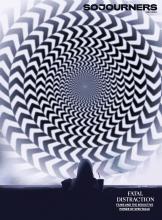
Illustration by Nicolás Ortega
Fatal Distraction: 3 Films Warn Us of the Seduction of Spectacle
EVERYTHING EVERYWHERE ALL AT ONCE, the absurdist sci-fi cinematic romp through the multiverse by a Chinese American laundromat owner in the L.A. mega sprawl, garnered seven Oscars this year, including for Best Picture. I’ve seen Everything Everywhere eight times. I’ve introduced it to friends. I did not think my favorite film could do anything wrong. What could be better than to be wrapped up in the spectacle created by directors Daniel Kwan and Daniel Scheinert and their amazing cast?
The directors’ over-the-top approach embraces the “too muchness” of its title. Laundromat owner Evelyn Wang (Michelle Yeoh) lives with her husband, daughter, and recently-arrived-from-China elderly father in a small apartment above the family business. Their dining room is cluttered with the American dream — workout equipment, inspirational business books, beeping electronic kitchen gadgets, a TV droning in the background, and a live security feed to the washers and dryers downstairs. “The Daniels,” as the directors are known, wrote in the original script, “It is a still life of chaos.”
Evelyn and her family are slowly spinning apart, and now the IRS is auditing the Wangs and their business. The forces of chaos are spreading beyond their little apartment. Later, while Evelyn is explaining to an IRS auditor (Jamie Lee Curtis) why her receipts are not in order, she gets a message from her husband (well, an alternative version of him) that she may be in grave danger and that she may hold the key to saving not only her own world but also the worlds in multiple universes and parallel time frames.
Despite its zany premise and on-screen absurdities (from anthropomorphic racoons and talking rocks to people with hot dogs for hands), Everything Everywhere never lets the spectacle eclipse the emotional story at its center: Evelyn is learning to find contentment in her own universe with her real family, even if she has the power to be elsewhere all at once.
‘No need to feel anything at all’
WHILE I DON'T regret my zealous championing of Everything Everywhere, film critic Justin Chang gave me pause. While Chang said he appreciated that the film centers an Asian American mother-daughter storyline and addresses “the social fragmentation and narrative oversaturation of the internet age and its attendant, all-consuming feelings of apathy and despair: the sense that ‘nothing matters,’” he also pointed out that the film is “so eager to bare its soul, to show you just how much its heart breaks for [its characters] and everyone in the whole damn multiverse, that it practically does all your emoting for you. There’s almost no need — and no room — for a viewer to feel anything at all.”
I had never considered — or even imagined — any other possible reaction to the film other than to be enraptured by its maximalism. While I think Everything Everywhere holds its emotional core, perhaps it caters too much to “the society of the spectacle,” as French philosopher and filmmaker Guy Debord put it in his book of the same name, where (quoting Ludwig Feuerbach), “illusion only is sacred, truth profane.”
Spectacle is often deployed as a sleight-of-hand trick to keep passive subjects distracted from the truth of what is going on. It has been used by industries and people in power to distract from the harm and abuse they perpetrate. You don’t need to look further than Hollywood itself for examples. While Harvey Weinstein was producing blockbusters such as Pulp Fiction, Shakespeare in Love, and Gangs of New York, he was also sexually abusing scores of women in the film industry. Why would a multibillion-dollar industry want to risk its profit margin by investigating a few rape cases?
Churches — where truth should be central — have also at times become places of spectacle. For example, charismatic religious leaders such as Ravi Zacharias and Bill Hybels used the spectacle of their ministries to cloak systematic sexual abuse of women. Jean Vanier, founder of another global Christian ministry, designed his early communities to provide opportunities for abuse of women in his pastoral care. The spectacle, Debord wrote, “is the affirmation that all human relationships are merely an image of relationship ... a complete negation of life that presents an appearance of life.”
Last year was not short on cinematic spectacle, including the Indian Telugu-language epic RRR (for “Rise, Roar, Revolt” in English) about revolutionary heroes battling the British Raj (it will not be the only film to run more than three hours mentioned in this piece) and Top Gun: Maverick, the explosive muscle movie that Steven Spielberg credited with saving the post-pandemic film industry. But three recent movies of note unmask the insidious danger of spectacle, revealing it as a way to control human thought by providing distraction and catharsis toward compliance.
Read the Full Article

Got something to say about what you're reading? We value your feedback!


